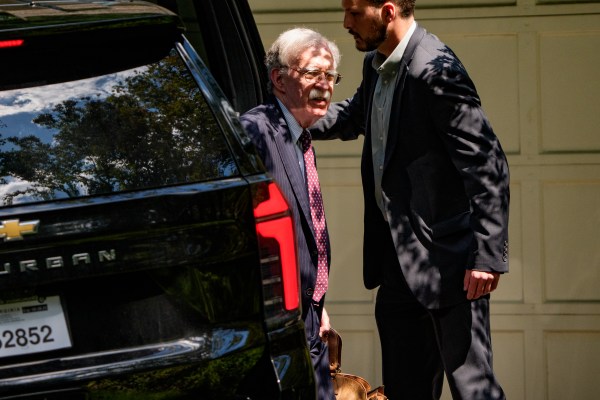Tuesday night’s Democratic debate was three hours long, and there was playoff baseball on. We don’t blame you if you tuned out. Here are the biggest things we took away from the show.
-
Warren Faces the Music
Late last month, Elizabeth Warren became the first candidate not named Joe Biden to land atop a national poll of 2020 Democrats, a feat she’s repeated a few times since. So it was no surprise that rivals who had previously focused their attacks on Biden or Bernie Sanders took plenty of shots at her this time around.
Andrew Yang and Beto O’Rourke went after her proposed wealth tax, which O’Rourke called “punitive.” Pete Buttigieg went toe-to-toe with her on the feasibility of Medicare for All. So did Amy Klobuchar, who called the signature policy a “pipe dream.”
In response, Warren sometimes looked cagey—circling around and around a few talking points, unwilling to cede even the smallest argumentative matters. At one point, Biden made a brief case for common purpose, talking about how as vice president he had whipped votes for a Warren brainchild: the Consumer Finance Protection Bureau. “I am deeply grateful to President Obama, who fought so hard to make sure that agency was passed into law,” Warren responded.
Another moment was even odder. Warren took a great deal of flak during the last few debates over her unwillingness to answer the straightforward factual question of whether her Medicare for All proposal would increase middle-class taxes. Sanders tackled that question head-on on Tuesday: “At the end of the day the overwhelming majority of people will save money on their health care bills. But I do think it’s appropriate to acknowledge that taxes will go up.”
This was a gift to Warren. All she had to say was “I agree with Bernie.” Instead, she circled back around to her previous talking points on “costs”—prompting Klobuchar to question her honesty.
Getting to the top is an extraordinary challenge—and Warren has succeeded. Staying there might prove even harder.
-
Don’t Count Bernie Out
Bernie Sanders hasn’t had a great autumn. He’s been sagging in the polls, and a minor heart attack earlier this month raised questions about whether he’s up for even running for president—to say nothing of the rigors of doing the actual job. A bad performance Tuesday might have put his campaign down for good.
Instead, Sanders seemed energetic and confident, railing against corporations and the wealthy with his trademark spleen. He was upbeat enough to brag about a “special guest” who will attend his New York rally on Saturday, whom the Washington Post reports will be Alexandria Ocasio-Cortez; she and several other young progressive lawmakers (including leading anti-Semites Rashida Tlaib and Ilhan Omar) will apparently endorse his campaign. Endorsements typically don’t matter much. But the center of gravity in the Democratic party is on the left and these young leftists will bring energy and excitement to the septuagenarian’s bid.
Warren has peeled off a lot of Bernie supporters on her way to the top of the polls. If she wavers, he may yet see a resurgence.
-
A “Moderate” Had a Moment—But Maybe Not the One You’re Thinking About
Amy Klobuchar may be tied for eighth in the RealClearPolitics polling average, but don’t tell her (or the CNN moderators) that. The Minnesota senator (who might not be so Minnesota nice!) tallied the third-most speaking time last night by the New York Times’ count, coming in ahead of everyone but Warren and Biden.
How did she do it? By repeatedly tangling with Warren over the practicality of the latter’s plans—and presenting her own, more pragmatic, proposals to the Ohio audience as viable in the Rust Belt and the heartland. “At least Bernie’s being honest here and saying how he’s going to pay for this and that taxes are going to go up,” she said during a segment on Medicare for All, jabbing Warren for being evasive. “I want to win those states that we lost last time, and I have bold ideas to get us there. And I think just because they’re different than Elizabeth’s doesn’t mean they’re bold.” (She presumably meant to include a “not.”)
Much has been made of the vaunted moderate “lane” of the primary thus far, a potential path to the nomination that’s been occupied by Joe Biden up until this point. But while Biden continues to sit in the catbird seat, his age, propensity for gaffes, and family’s involvement in the ongoing Ukraine saga present risks that could undo him at any moment. He was the center of attention for three straight debates, but there were times last night one could be forgiven for forgetting he was even on the stage. Klobuchar and Mayor Pete are tailoring their messages to pick up any of the former vice president’s voters if he falters, but interestingly enough, polling shows Warren may actually be in the best position to do so.
If all else fails, Klobuchar could always try her hand at stand-up comedy.
Impeachment Update
Last week, we filled you in about the White House’s strategy to combat House Democrats’ nascent impeachment inquiry: Denounce the whole thing as a politically motivated scam and refuse to cooperate in the slightest. Since then, a number of people in Trump’s orbit have announced they will not honor House subpoenas, including Mike Pence, Rudy Giuliani, Defense Secretary Mark Esper, and acting White House chief of staff Mick Mulvaney.
And yet, House Democrats have locked down interviews with enough key former officials to fill in many key details. Most of those details remain hidden, as Democrats refuse to make public the transcripts of these recent grillings. But we’re learning more. The most notable of these interviews has been Trump’s former top Russia adviser, Fiona Hill, who, according to the New York Times, testified under oath Monday that questionable dealings between the White House and Ukraine were actually taking place substantially before Trump’s notorious call with Zelensky on July 25. Of particular note was one July 10 meeting between senior White House and Ukrainian officials:
The purpose of the meeting was to talk about technical assistance to Ukraine’s national security council. The Ukrainians were eager to set up a meeting between Mr. Trump and Mr. Zelensky…
[Then-National Security Adviser] Bolton was trying to not commit to a meeting, according to Ms. Hill’s testimony. [Ambassador to the E.U. Donald] Sondland got agitated, Ms. Hill testified, and let out that there was an agreement with Mulvaney that there would be a meeting if Ukraine opened up the investigations the White House was seeking.
Hill’s testimony put Bolton, her boss, at the center of the skepticism about Giuliani’s Ukraine work, calling him a “hand grenade” and distancing himself from the “drug deal” Giuliani and Sondland were allegedly “cooking up” with Mulvaney. If Hill’s characterization of Bolton’s views are accurate, it’s trouble for the White House. It’s been easy for Trump’s defense to cast Adam Schiff’s investigation as partisan because Adam Schiff has been a partisan as he’s run the investigation. But John Bolton has long been a conservative stalwart, a well-known GOP foreign policy hand and a critic of the permanent national security bureaucracy. It simply won’t be credible for the White House to portray Bolton as a tool of the “deep state.”
Sondland Speaks
Hill’s testimony also shines an even brighter spotlight on Sondland, who is scheduled to testify before Congress on Thursday. Sondland first rocketed into the news last week after Congress released text messages between him and several other regional ambassadors in which he comes across as the group’s Trump stalwart on the Ukraine controversy. “Bill, I believe you are incorrect about President Trump’s intentions,” he wrote Bill Taylor, the top U.S. diplomat in Ukraine. “The President has been crystal clear no quid pro quos of any kind.” Many Trump supporters quickly concluded that Sondland would be a strong defender of the president. The Trump administration nevertheless blocked Sondland from testifying before Congress last Tuesday. Then late last week, Sondland agreed to testify, apparently defying the State Department’s orders.
But What Does He Have to Say?
Sondland has wanted to be an ambassador for a long time, but he hasn’t always been a Trump guy. Early in the 2016 cycle, in fact, he was a Jeb Bush supporter whose Trump skepticism helped spark a friendship between him and Karl Rove. Sondland later supported Trump and his fundraising in the Pacific Northwest made him a favorite of Steve Mnuchin, then the Trump campaign’s finance chairman. But Sondland stepped away from Trump after Trump picked a fight with Khizr Khan, whose son was killed in Iraq in 2004.
After Trump was elected, Sondland donated $1 million to the inaugural committee and his name soon circulated as a possible ambassador. But Sondland, like others who had criticized Trump during the campaign, was viewed skeptically by the president’s vetters. According to sources close to the process, when Sondland was finally confirmed as the U.S. ambassador to the European Union, he was eager to show Trump that he was now firmly in his corner—including by diving headfirst into tackling his priorities on Ukraine.
Those responsibilities put Sondland at the center of the current controversy, and his testimony Thursday will undoubtedly fill in more of the missing details.
We asked Rudy Giuliani, the president’s lawyer and political diplomat, whether Sondland’s decision to testify, apparently against the wishes of the administration, meant he would distance himself from Trump’s decision-making on Ukraine. Giuliani, who has gone to some lengths to show how closely he worked with other top State Department officials, including Secretary of State Mike Pompeo and Special Envoy to Ukraine Kurt Volker, pleaded ignorance. “Don’t know much about him,” he told The Dispatch Tuesday. “I talked to him about this and he seemed like he was in charge and acting professionally.”
Testimony Bonus Round
Sondland isn’t the only official scheduled to testify before House committees about impeachment this week. Also: Former Mike Pompeo aide Michael McKinley, who resigned from the State Department last week.
Rep. Kinzinger on Syria Fallout: “Anybody That Knows Anything Saw This Coming”
The dominoes continue to fall in the Middle East after Trump threw the region into disarray with his decision to pull troops back from northeastern Syria and clear the way for a Turkish incursion into the area. Since we last touched base, the administration did indeed place the sanctions on Turkey that Secretary Mnuchin warned about on the Sunday shows, with President Trump also increasing steel tariffs to 50 percent and suspending negotiations on a potential $100 billion trade deal between the two countries.
The White House is also planning to dispatch Vice President Pence and Secretary Pompeo, among others, to Turkey on Thursday to attempt to, as Pence tweeted, “stop the invasion, enact an immediate ceasefire & begin negotiations to restore peace and stability to the region.”
This executive action and diplomatic operation proved enough to bring Republicans eager to support the president back into the fold. Sen. Lindsey Graham, who less than a week ago told Axios Trump was “putting the nation at risk” and “putting his presidency at risk” with his moves in Syria, applauded the sanctions and abruptly returned to the comfort of Trump sycophancy: “The President’s team has a plan and I intend to support them as strongly as possible, and to give them reasonable time and space to achieve our mutual goals.”
But Rep. Adam Kinzinger, an Air Force veteran of both Iraq and Afghanistan and a widely respected foreign policy voice in Congress, told The Dispatch Tuesday night he isn’t confident in the White House’s plan: “I don’t think there’s a lot of strategy, frankly.” Same goes for Senate Majority Leader Mitch McConnell, who said he is “gravely concerned” by the United States’ “apparent response thus far.”
More Kinzinger, on the cost of America stepping back:
The only thing that’s caught me by surprise is just how immediately we have an example of what isolationism actually does to the world. We immediately have an example of the good role American presence can play in creating peace, and we immediately have an example of what happens when America walks away. So that’s what surprised me is how quickly that happened. But the consequences haven’t surprised me whatsoever. Anybody that knows anything saw this coming.
Among the “anybody” who saw this coming? American military personnel, who have, on the whole, expressed deep dissatisfaction with the administration’s moves. A member of U.S. Special Forces told Fox News, “I am ashamed for the first time in my career.” Another officer told the New York Times the move is “a stain on the American conscience.” Army Secretary Ryan McCarthy, asked about troops speaking up like this, said “I think more and more soldiers are very candid about how they feel; I like candor, it’s important to have that. Everybody has opinions; it’s a war of ideas. But ultimately, when national policy decisions are made, we salute and move out.”
Kinzinger agreed. Although he conceded that having to “turn and walk away from” the Kurds is “disheartening,” he also said that active-duty military personnel “really shouldn’t be going to the press” with their opinions because the job is “to salute the Commander-in-Chief and carry out those orders.” Members of the guard and reserve like himself? “Say whatever you want.”
What Else We’re Reading/Watching
-
How many lobbyists does it take to staff one swamp-draining presidential administration? ProPublica has the answer, and it’s 281: “one lobbyist for every 14 political appointees, and four times more than Obama had appointed six years into office.”
-
From the Washingtonian’s Benjamin Wofford, a fascinating interview with Trevor Potter, former chairman of the Federal Election Commission, who played a crucial behind-the-scenes role in highlighting the shady work of Lev Parnas an Igor Fruman, two associates of Rudy Giuliani.
Presented Without Comment
Something Fun
The Washington Nationals swept the St. Louis Cardinals Tuesday night to punch their ticket to their first-ever World Series. (The Cardinals fan and Cubs fan who co-write this newsletter met the news with differing reactions.)
Toeing the Company Line
-
What do Biden gaffes and the G-File have in common? There are now more than one of both of them per week! Be sure to check out the first non-Friday G-File from Jonah in more than a decade—he dissects the troubling Kingsman parody video that surfaced earlier this week, Steve Mnuchin’s inability to discuss the president’s “seriousness,” and whether Adam Schiff’s partisanship actually changes anything in the impeachment inquiry.
-
If that doesn’t max out your Goldberg quota for the day, he also talked into a microphone for an hour and three minutes about Syria, impeachment, and the threat of an alien invasion. Get The Remnant here.
Let Us Know
The Washington Post reported late last night that Alexandria Ocasio-Cortez, Ilhan Omar, and Rashida Tlaib will be endorsing Bernie Sanders, providing the senator a major boost of energy. Which endorsement would be the least helpful for Bernie’s campaign?
-
Debbie Wasserman Schultz
-
Jeff Bezos
-
The Dispatch
-
Barack Obama
-
Tom Steyer
Reporting by Declan Garvey, Andrew Egger, and Steve Hayes.






Please note that we at The Dispatch hold ourselves, our work, and our commenters to a higher standard than other places on the internet. We welcome comments that foster genuine debate or discussion—including comments critical of us or our work—but responses that include ad hominem attacks on fellow Dispatch members or are intended to stoke fear and anger may be moderated.
With your membership, you only have the ability to comment on The Morning Dispatch articles. Consider upgrading to join the conversation everywhere.